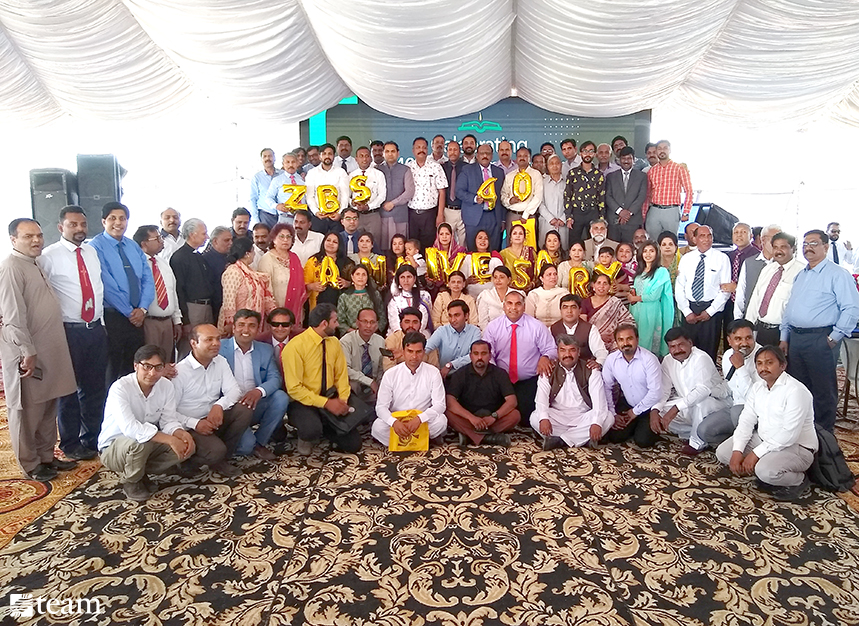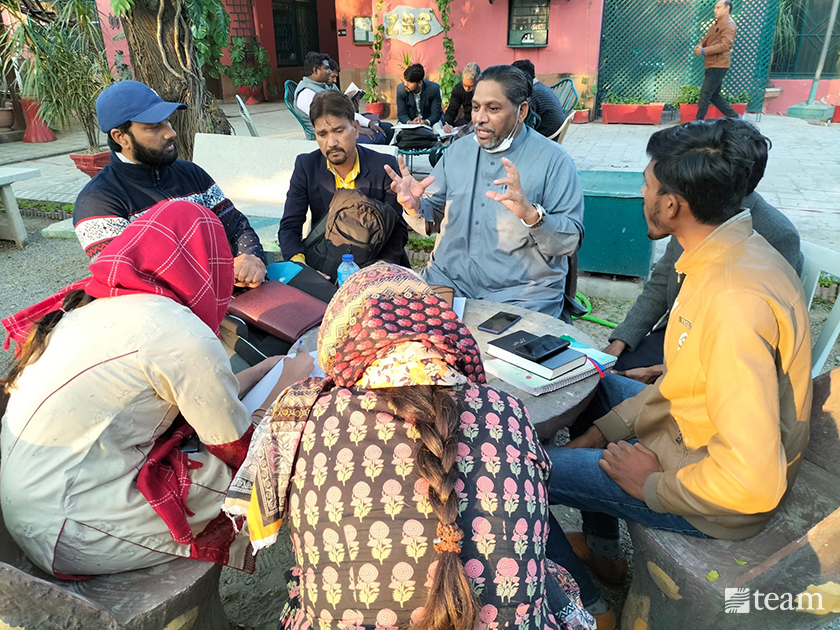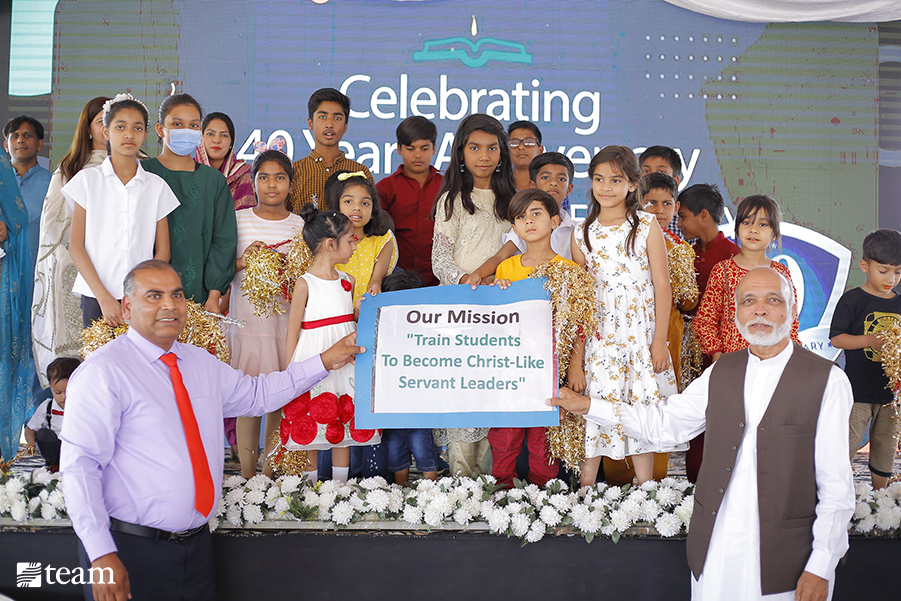
Ministry Updates
Refining Gold in Pakistan
May 19, 2022
by Suzanne Pearson

The word Zarephath in Hebrew means “a place where gold is refined.” For 40 years, God has been refining gold for His Kingdom in Pakistan through Zarephath Bible Seminary. What began as an initiative of mostly western missionaries has grown into an amazing institution led by Pakistani leaders who train up other leaders to impact their nation for Christ.
It Began with a Question
The ZBS journey began in the mid-1970s. TEAM global workers saw the need for a Bible training program in Pakistan. They began asking the question, “How can we train local leaders to be pastors and leaders in the church?” The first meeting of a new multi-organization task force took place in November 1976 with eight mission organizations represented.
The committee spent the next few years praying and working through the logistics of each agency’s role. TEAM quickly became instrumental in the formation of the seminary by providing the first teachers as well as helping secure the land to build the first campus.
“Zarephath Bible Institute” opened its doors in August 1982 to a handful of students. (The name later changed to Zarephath Bible Seminary.) As time went on, other mission groups invested in the seminary by providing teachers and funding. Zarephath quickly became a collaborative effort. Since that time, ZBS has grown steadily both in student attendance and training opportunities. Over the years, the seminary has navigated various challenges, but God is always faithful in bringing about His purposes.
Innovative Thinking About Theological Education
One hurdle the school faced was the same one that challenged us all – COVID. “The pandemic brought on an increase in Zoom meetings and modular education,” says Dr. John Condie, Area Leader for TEAM Pakistan. Prior to COVID, the seminary had not engaged in any type of online instruction, so there was quite a learning curve. Figuring out all the new technology was a challenge, but not one without great rewards.
“Economically, it’s [now] more feasible for many people to get training,” John explains. People whose circumstances prevented them from enrolling in the seminary courses in person could now access the same coursework online. “Students all the way from the United Arab Emirates and from all over Pakistan now join the classes on Zoom. [COVID] prompted some innovative thinking about theological education.”
This innovative thinking refined the seminary’s use of modular education, referring to coursework completed outside of a traditional full-time schedule. “There’s been a transition in theological training all around the world as pastors of young or small churches want additional training,” says John. “They can’t leave their work and go [to a full-time training program].”
Some of these pastors have had formal pastoral education and are looking for supplemental training. Others are lay people who have started small churches or ministries without any formal training at all. ZBS helps both through one-week modular training sessions held throughout the year. Pastors can fit the modules into their calendars while continuing with their ministry work.
Expanded Opportunities and Collaboration
Another beneficial aspect of Zarephath’s programming is the scope of training that’s available. Most of the seminary’s students train to be pastors but there are also opportunities available for other types of ministry. These include women’s and children’s ministry as well as training for worship and music ministry.
ZBS collaborates in an educational joint venture as well. Forman Christian College and ZBS joined forces with Development Associates International (DAI) to hold a modular, three-year “Masters in Organizational Leadership.” A number of TEAM Pakistan’s leaders in various ministries were in the first cohort. Dr. Angela Condie (John’s wife) notes that it’s exciting to see people working in parachurch ministries taking advantage of this program. “For example,” she says. “there is a woman who runs [a camp] and another who is the principal of a girls’ school who have both graduated from the course.”

ZBS students take the skills they learn into various churches and ministries throughout Pakistan and beyond.
Cross-Cultural Connections
In Pakistan, the population is 97% Muslim with Hindu and Christian minorities making up the remaining 3%. Many of the Christians in Pakistan come from a low-caste Hindu group that was introduced to Christianity in the early 1900’s. These Christian people have struggled for generations with poverty and being seen as less-than by the Muslim majority.
However, over time, Christian schools have helped provide a better education for these believers. A generation of young, Christian professionals is emerging. John and Angela have the privilege in serving alongside these believers in their healthcare setting. “We have Christian doctors and nurses who are working at our hospital, all of whom have come, probably two generations ago, from that kind of very low cast background,” says John. “Many of their parents or grandparents were illiterate, but they’ve come up from that.”
Zarephath Bible Seminary provides a similar opportunity for Christian believers whom God has called to cross-cultural ministry. Men and women from all over Pakistan learn Christian leadership skills that they can then put into practice meeting the needs of the communities they came from. Students at ZBS also have the opportunity to study the Arabic language as well as the Quran to help break down cultural barriers and better understand and connect with their Muslim neighbors.
A Passing of the Baton
The cross-cultural shift in ministry has occurred within the seminary’s staff and leadership itself as well. Zarephath’s early days were staffed by western missionaries, but now the faculty and administration is nearly 100% Pakistani. “I think the biggest milestone that I can think of is the transition from missionary leadership to Pakistani leadership,” says John. “As men and women were trained, they then were capable of taking over the leadership.”
With Pakistani leadership flourishing at the seminary, TEAM’s role has changed to a mostly advisory capacity along with serving as a conduit for U.S. donors to give financially to the seminary. As ZBS celebrates its 40th anniversary, the seminary stands as a beautiful example of the global Church.
A Time to Celebrate
On April 23, hundreds of Zarephath Bible Seminary alumni, current and former faculty members, and families gathered together to celebrate 40 years of God’s faithfulness. The festivities included wonderful fellowship, food, and music as friends reunited and shared where God has led them in ministry. Speakers included current seminary President, Rev. Shahbaz Boota as well as his predecessor, Rev. Ashkenaz Asif. The group also heard from Nate Irwin, TEAM global worker and another former principal of ZBS.
“Many faculty and former students told stories of how God has been working through ZBS,” shares Rev. Boota. “That was a good reminder of God’s faithfulness in our lives and in the life of Zarephath Bible Seminary.”
The future of the Church in Pakistan is bright as ZBS continues to model globalized ministry and the equipping of national church leaders. In a photo from the anniversary celebration, the children of those in attendance pose together with a sign that says, “Our mission: Train Students to Become Christ-Like Servant Leaders.” With God’s blessing, gold will continue to be refined in Pakistan for generations to come.

The children of ZBS faculty and alumni represent a promising future for the Church in Pakistan.
Related articles


